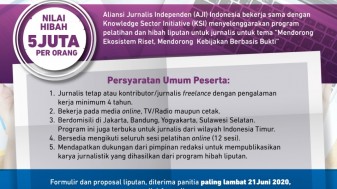The Knowledge Sector Initiative (KSI) is a partnership between the governments of Indonesia and Australia. It is funded by the Department of Foreign Affairs and Trade (DFAT) and implemented in cooperation with the Ministry of National Development Planning/ National Development Planning Agency (Kementerian Perencanaan Pembangunan Nasional/ Badan Perencanaan Pembangunan Nasional, Bappenas).
The Knowledge Sector Initiative (KSI) supports Indonesian policymakers to develop more effective development policies through better use of research, data, and analysis. KSI works with research providers and government agencies to strengthen the quality and policy-relevance of research and how it used for policymaking. KSI also works to improve regulations and practices that support quality research and make using evidence in policymaking easier.
In 2018 KSI supported Kemenristek/BRIN in updating its Research Grant Guidelines Edition XII to incorporate Gender Equality and Social Inclusion (GESI) principles for the first time in order to encourage universities to conduct more GESI research. The research grants are managed by Directorate of Research and Community Services (DRPM) through an online information system called Simlitabmas, mainly accessible for university lecturers. In 2018, KSI in collaboration with Cakra Wikara Indonesia (CWI) and DRPM also supported technical guidance sessions for university researchers in three provinces. The sessions provided an opportunity for DRPM to introduce the new guidelines, encourage the research to do GESI related research and raise awareness of how to do this.
To ensure the wider outreach of the new guideline, during 2020 KSI is supporting DRPM to produce two videos to promote more GESI research, to be released before the call for 2021 grants opens in late September/early October 2020 and closes in late October/early November 2020 There will be two videos – one in Bahasa Indonesia and one in English - to introduce the guidelines to a larger audience, encourage researchers to do GESI research and promote collaborative research involving not only university lecturers, but also government, civil society organizations, policy research institutes, and the private sector. The video will highlight the following:
- Provide an overview of the landscape of GESI research in Indonesia based on key statistics such as the number of women researchers, the number of funded research projects with a GESI perspective, as well as policies introduced by Kemenristek/ BRIN on GESI.
- Feature three researchers representing a woman researcher, a researcher whose research topic has mainstreamed GESI perspective and a researcher whose research objects reflect one or multiple elements of GESI.
- If feasible, footage of the above researchers at work.
The Bahasa Indonesia version is intended to target Indonesian researchers and the scientific community in Indonesia. The English version is intended to reach a wider audience, specifically Kemenristek/BRIN’s international research/ research funder partners and to be presented at international meetings. Each video is to have a duration of around three minutes.
KSI will also support a short-term campaign on mainstreaming GESI perspectives in research in Indonesia which could consist of articles and postings relevant to the topics, as well as writings from the featured researchers on their work. The videos and campaign materials are being produced by The Conversation Indonesia.
In 2019, KSI engaged CWI to produce a Story of Change on the process of revising the guidelines and its initial impact, which included data on the number of GESI research proposals submitted by universities to DRPM in 2018 (for funding in 2019). The first attempt to monitor the progress was done in 2019, by looking at the numbers of 2018 and 2019 GESI related research that were funded by Government of Indonesia through DRPM. KSI is commissioning a further evaluation to monitor the extent to which the guidelines and the campaign materials (videos, articles and postings) are leading to more GESI research.
Objective
KSI is recruiting a National Consultant to produce an analysis of the extent to which the mainstreaming of GESI in the research grant guidelines of the Ministry of Research and Higher Education/National Research and Innovation Agency (Kemenristek/BRIN) has led to universities undertaking more GESI-sensitive research and the extent to which application of these guidelines is likely to be sustainable.
The M&E findings will be used for the following purposes:
- Learning – to inform the Government of Indonesia (especially Kemenristek/BRIN’s Department of Research and Community Engagement or DRPM) of any improvements needed to the guidelines and application of these, as well as to inform KSI on how it could improve its support and DFAT in terms of how it could support this area in the future.
- Accountability – to demonstrate progress in implementing current strategy and KSI’s contribution to this process.
The primary audiences for this evaluation are Kemenristek/BRIN, KSI, and DFAT. The evaluation will identify recommendations to improve the implementation of current GESI Guideline and identify which stakeholders are best placed to help address these.
Consultant Specification
The National Consultant should have the following skills and experience:
- Demonstrated practical experience and skills in mixed methods for monitoring and evaluation.
- Familiarity with DFAT monitoring and evaluation requirements as well as other international development programs.
- A high standard of report writing and oral communication skills.
- Strong leadership and ability to work effectively in a team.
- Cultural and gender sensitivity.
It is also desirable for the National Consultant to have the following skills and experience:
- Demonstrated practical experience and skills working on GESI issues
- Familiarity and/or experience with university research
--
If you are keen to be part of this exciting program, you are welcome to apply by sending your updated CV to procurement_team@ksi-indonesia.org. Please indicate position you have applied for in the email subject. The closing date for applications is 9 October 2020


